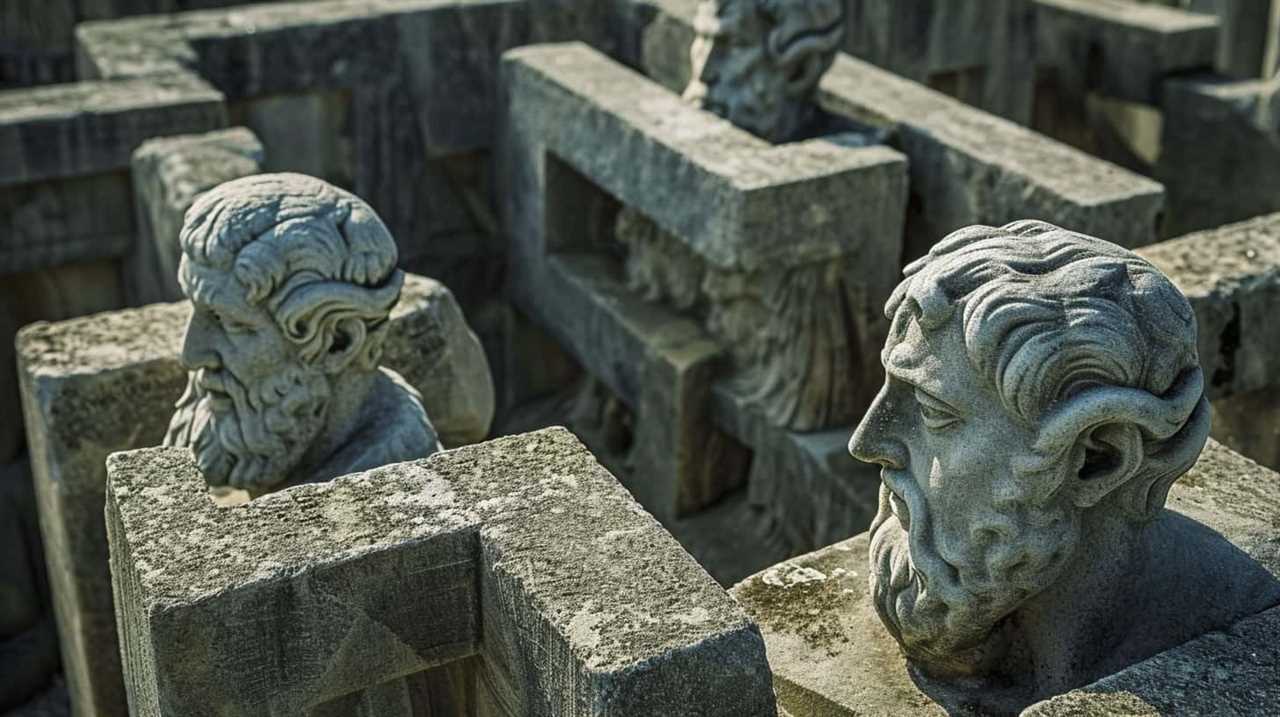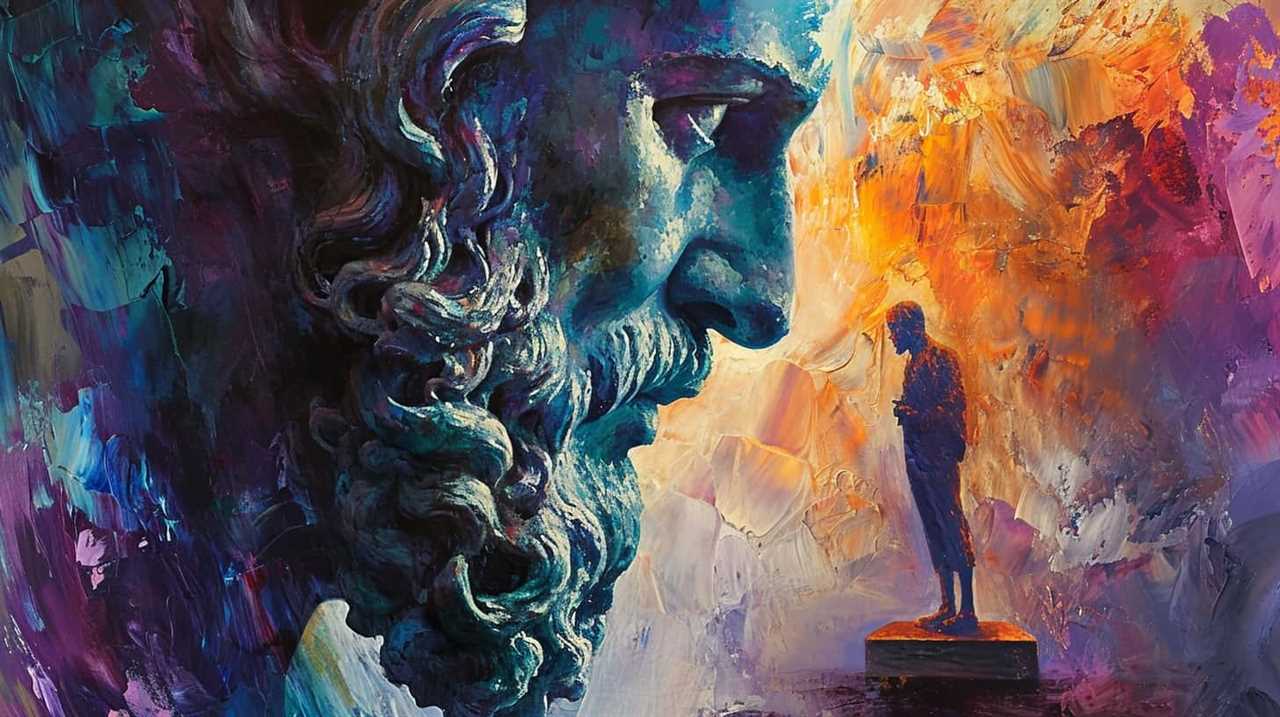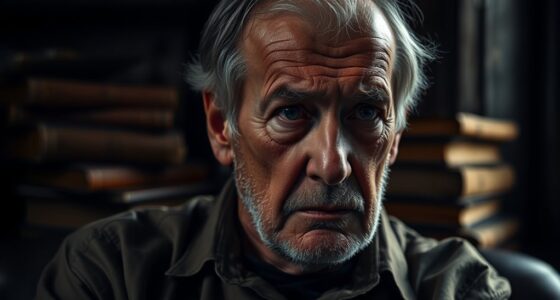In order to deepen our understanding of the intricate connection between power and ethics, we look to the wisdom of five renowned philosophers.
These thinkers have delved deep into the realms of justice, morality, and the nature of power. For instance, Plato, the ancient Greek philosopher, explored the connection between political power and justice in his renowned work ‘The Republic.’
Aristotle, another legendary philosopher, examined the importance of cultivating virtues in our ethical journey.
Machiavelli, on the other hand, provided a thought-provoking analysis of power and morality.
And let us not forget Kant, who developed a moral philosophy centered around the categorical imperative.
Lastly, Foucault’s critique of power and his concept of the panopticon shed light on the dynamics of power in modern societies.
Join us as we embark on a fascinating exploration of these philosophers’ insights on power and ethics.
Key Takeaways
- Plato emphasized the importance of justice in creating an ideal society and believed that philosopher-kings should hold political power.
- Aristotle believed that the goal of human life is to achieve eudaimonia and that ethics play a crucial role in personal and societal flourishing.
- Machiavelli challenged traditional notions of morality by arguing that the end justifies the means in maintaining power, prioritizing rulers’ interests and stability over conventional ethics.
- Kant developed a moral philosophy centered around the categorical imperative and emphasized the importance of acting out of duty and treating individuals as ends in themselves rather than means.

Plato’s Views on Justice and Political Power
In our exploration of power and ethics, we delve into Plato’s profound perspective on justice and the inherent connection it bears with political power. Plato, the renowned Greek philosopher, believed that justice was the foundation of an ideal society. According to Plato, justice is the harmony that exists when each individual performs their proper role in society.
Plato’s concept of justice is deeply intertwined with his vision of an ideal society. In his famous work, ‘The Republic,’ Plato outlines his vision of the perfect city-state, which he believes can only be achieved through the establishment of a just society. According to Plato, a just society is one in which each individual fulfills their designated role, thereby contributing to the overall harmony and well-being of the community.
In Plato’s ideal society, political power is in the hands of the philosopher-kings. These philosopher-kings are individuals who possess both a love for wisdom and a deep understanding of justice. Plato argues that only these philosopher-kings possess the knowledge and wisdom necessary to make just decisions and govern the city-state in a way that promotes the common good.
Plato’s concept of justice extends beyond the confines of political power. He believed that justice should also prevail in the individual soul. According to Plato, a just individual is one whose reason governs their desires and emotions. When each part of the soul is in harmony, the individual can achieve true happiness and fulfillment.
Plato’s views on justice and political power offer valuable insights into the ethical implications of power. His belief in the connection between justice and an ideal society reminds us of the importance of striving for fairness and harmony in our own communities. By promoting justice and cultivating wisdom, we can work towards creating a society that serves the common good and fosters the well-being of all its members.

Aristotle’s Ethics and the Pursuit of Virtue
Let’s delve into Aristotle’s ethics and how they emphasize the pursuit of virtue. Aristotle believed that the ultimate goal of human life is to achieve eudaimonia, which can be translated as "flourishing" or "the good life." According to Aristotle, eudaimonia is not simply about personal happiness, but rather about living in accordance with one’s true potential and cultivating virtuous character.
Aristotle’s concept of eudaimonia is closely tied to his understanding of virtue. He believed that virtue is not something innate or fixed, but rather a result of deliberate practice and habituation. In other words, virtuous character development requires conscious effort and sustained practice. It is through the cultivation of virtues such as courage, temperance, and justice that individuals can achieve eudaimonia.
Ethics, for Aristotle, plays a crucial role in both personal and societal flourishing. He believed that ethics is not just about following a set of rules or principles, but about developing virtuous habits and character traits. In order for a society to flourish, its members must be virtuous and act in accordance with ethical principles. This requires individuals to strive for excellence in all aspects of their lives and to prioritize the common good over self-interest.
To illustrate the connection between ethics and flourishing, let’s consider a simple table:
| Personal Level | Societal Level |
|---|---|
| Cultivating virtues leads to personal flourishing | A virtuous society leads to societal flourishing |
| Ethical actions contribute to individual well-being | Ethical decisions benefit the entire community |
| Pursuit of virtue enhances personal growth | Ethical behavior fosters social cohesion |
Aristotle’s ethics remind us that the pursuit of virtue is not only essential for our own well-being but also for the betterment of society as a whole. By striving to cultivate virtuous character and act in accordance with ethical principles, we can contribute to a world where individuals and communities can truly flourish.

Machiavelli’s Analysis of Power and Morality
Machiavelli’s analysis of power and morality reveals the complex relationship between leadership and ethical considerations.
Machiavelli, a renowned political philosopher, is often associated with his controversial political strategies outlined in his book, ‘The Prince.’ His ideas challenge traditional notions of morality and raise important questions about the moral implications of his analysis of power.
Machiavelli’s political strategies are centered around the notion that the end justifies the means. He argues that rulers should do whatever it takes to maintain their power, even if it means resorting to immoral actions. According to him, leaders should prioritize their own interests and the stability of their rule above all else. This utilitarian approach disregards the conventional ethical framework that emphasizes virtues such as compassion, honesty, and justice.
The moral implications of Machiavelli’s analysis of power are profound. On one hand, his ideas can be seen as a realistic assessment of the political landscape, acknowledging the ruthless nature of power dynamics. They offer practical guidance for leaders who are faced with difficult decisions and turbulent times. However, on the other hand, his disregard for moral principles raises concerns about the potential abuse of power and the erosion of ethical values in leadership.
The question then arises: can power and morality coexist? Machiavelli’s analysis challenges us to reconsider the role of ethics in leadership. While his ideas may seem morally objectionable, they shed light on the complexities of leadership and the difficult choices leaders often face. It’s crucial for leaders to navigate the tension between power and morality, finding a balance that serves the greater good while upholding ethical principles.

Kant’s Moral Philosophy and the Categorical Imperative
Kant’s moral philosophy presents a powerful framework for examining the ethical dimensions of power through the concept of the categorical imperative. Kant’s duty-based ethics focuses on the idea that individuals have moral obligations that are grounded in reason and universal principles. According to Kant, the categorical imperative is a principle that guides moral actions and applies to all rational beings. It’s an unconditional command that individuals must follow regardless of their desires or personal interests.
The categorical imperative is based on the idea of treating others as ends in themselves, rather than merely as means to an end. This means that individuals should never use others solely for their own benefit, but instead, should respect the inherent dignity and autonomy of every person. In the context of power, this principle challenges individuals in positions of power to use their authority responsibly and for the greater good of society.
By applying the categorical imperative, individuals in positions of power are compelled to consider the consequences of their actions and the impact they’ve on others. They’re called to uphold moral principles and act in ways that are fair, just, and respectful of human rights. This ethical framework provides a guide for individuals to navigate the complexities of power and make decisions that are morally sound.

Foucault’s Critique of Power and the Panopticon
Foucault’s critique of power and the panopticon sheds light on the mechanisms of control and surveillance within institutions. His concept of disciplinary power and the panopticon offer valuable insights into the ways in which power operates in society and the effects it has on individuals.
Here are three key aspects of Foucault’s critique of power and the panopticon:
- Disciplinary power: Foucault argues that power isn’t just exercised by a few individuals or institutions, but is instead dispersed throughout society. He proposes the concept of disciplinary power, which operates through various techniques and institutions that discipline and regulate individuals. These techniques include surveillance, normalization, and examination, all of which aim to shape and control behavior.
- The panopticon: The panopticon, a metaphorical concept introduced by Foucault, represents a form of surveillance society. It’s a circular prison design where inmates are constantly visible to a central watchtower, but can’t see the observer. This asymmetry of visibility creates a sense of constant surveillance and self-discipline among the inmates. The panopticon serves as a powerful symbol of the pervasive nature of disciplinary power and its ability to control behavior through the mere possibility of being watched.
- Surveillance society: Foucault’s critique of power and the panopticon also speaks to the broader issue of surveillance in society. In the modern world, surveillance has become increasingly prevalent, with technology enabling constant monitoring and tracking of individuals. This raises questions about privacy, autonomy, and the potential for abuse of power. Foucault’s insights into the panopticon and disciplinary power offer a critical lens through which to analyze and understand the implications of surveillance society.
Foucault’s critique of power and the panopticon provides a thought-provoking perspective on the ways in which power operates and shapes individuals within institutions. By examining the mechanisms of control and surveillance, we can better understand the dynamics of power and work towards creating a more just and equitable society.

Frequently Asked Questions
How Does Plato’s Concept of Justice Relate to His Views on Political Power?
Plato’s concept of justice is intricately connected to his views on political power. He believed that a just society could only be achieved when power is in the hands of those who possess knowledge and wisdom.
What Are Some Key Principles of Aristotle’s Ethics and How Do They Contribute to the Pursuit of Virtue?
Aristotle’s ethics emphasize key principles that contribute to the pursuit of virtue. By examining Plato’s concept of justice and political power, Machiavelli’s analysis of power and morality, Kant’s categorical imperative, and Foucault’s critique of power, we gain valuable insights into ethical decision making.
How Does Machiavelli’s Analysis of Power and Morality Challenge Traditional Ethical Norms?
Machiavelli’s analysis of power and morality challenges traditional ethical norms by advocating for a pragmatic approach that prioritizes the preservation of power and the achievement of desired outcomes, rather than adhering to moral principles.
What Is the Concept of the Categorical Imperative in Kant’s Moral Philosophy and How Does It Guide Ethical Decision-Making?
The concept of the categorical imperative in Kant’s moral philosophy provides a framework for ethical decision-making. It emphasizes universal principles and the importance of treating others as ends in themselves, guiding us towards morally responsible actions.
How Does Foucault’s Critique of Power Relate to His Concept of the Panopticon?
Foucault’s critique of power illuminates the sinister nature of the panopticon. By examining the relationship between surveillance and control, he reveals the insidious mechanisms that perpetuate oppression and limit individual autonomy.

How Do Philosophers’ Insights on Social Justice Tie into Their Views on Power and Ethics?
The best philosophers’ social justice insights often revolve around the relationship between power and ethics. They argue that those in power have a responsibility to ensure social justice, using their influence to promote ethical behavior and equitable treatment for all members of society.
Conclusion
In conclusion, the insights provided by these five philosophers shed light on the complex relationship between power and ethics.
From Plato’s emphasis on justice and political power to Foucault’s critique of power and the panopticon, each philosopher offers a unique perspective that challenges our understanding of power dynamics in society.
By exploring these theories, we can gain a deeper understanding of the ethical implications of power and strive towards a more just and equitable society.









